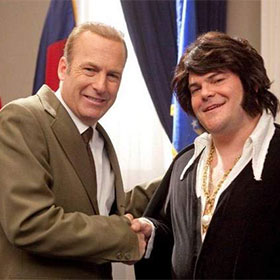'Drunk History' TV Review: 'Funny Or Die' Creation Is A Hit

4/5
Drunk History, the series that originated in 2007 on the comedy site Funny or Die, debuted its pilot on Comedy Central with three stories – two laugh-out-loud funny ones, and a third that didn’t work.
The episode started with Matt Gourley’s drunk telling of Watergate. He gave the back-story of Bob Woodward and his relationship with Mark Felt, or “Deepthroat,” portrayed by Fred Willard. With these actors, as well as Jack McBrayer as H. R. Haldeman, and Bob Odenkirk as President Richard Nixon, Gourley’s drunken slurring and rambling became a ridiculous and entertaining sketch.
An especially funny moment in the story came when Woodward vomited in front of Felt during a secret meeting – a parody of Gourley actually getting sick from the amount of alcohol he had consumed. That was one of the few instances in the episode in which the skit actors broke character because the narrator interrupted the story with his own actions. Unexpected breaks such as this at times made me laugh harder than the stories themselves.
The second story was arguably the best of the night, and had me muffling my would’ve-been obnoxious laughter. Allan MacLeod told the story of the Booth brothers and the assassination of President Abraham Lincoln. He explained that assassin John Wilkes (Adam Scott) was rejected by his father – played by a hilarious Jonathan Ames – in favor of his more talented brother, Edwin – portrayed by an animated and effervescent Will Forte.
MacLeod’s drunken giddiness and rambling was what made this story so comical. Well, that and Scott’s hysterical overacting of MacLeod’s storytelling – including his over-the-top nursing of a hurt ankle after jumping on stage, in reality brought on by MacLeod’s pain from arm-wrestling during the storytelling.
The final story of the episode did not hold up with the first two. First off, the clip was much shorter, which made it feel like it was crammed in to this episode. Second, and most of all, I didn’t totally buy that storyteller Eric Edelstein was drunk; at least, he wasn’t drunk enough to make the story as funny as it could’ve—and should’ve—been. Because his enunciation was clearer and not as similarly babbling as Gourley’s and MacLeod’s, the story – about Elvis Presley (Jack Black) becoming a narcotics officer – felt more contrived than comical, bringing down what could’ve been a hilarious telling of a ridiculous story.
Overall, I have high hopes for the series and think that if it follows the same protocol that brought it to its initial popularity and avoids the more artificial feeling of the third story, it should be fine. It could maybe even lead a few viewers to take genuine interest in their history homework.
One of my favorite qualities of the show already is that Derek Waters – the host of the show and original creator/host of the internet series who nearly always makes a cameo in the sketches – has kept on his friends to tell stories, rather than scripting out historical stories and handing them off to more professional and well-known comedians to tell on air. It keeps some of the fun and novelty of the original series alive.
As for the rest of the show, I look forward to, hopefully, seeing Jen Kirkman tell a story soon – she may be my favorite storyteller from the original episodes.
For more like this 'Drunk History' TV review, check out Uinterview's TV review section here.
RELATED ARTICLES
Get the most-revealing celebrity conversations with the uInterview podcast!







Leave a comment